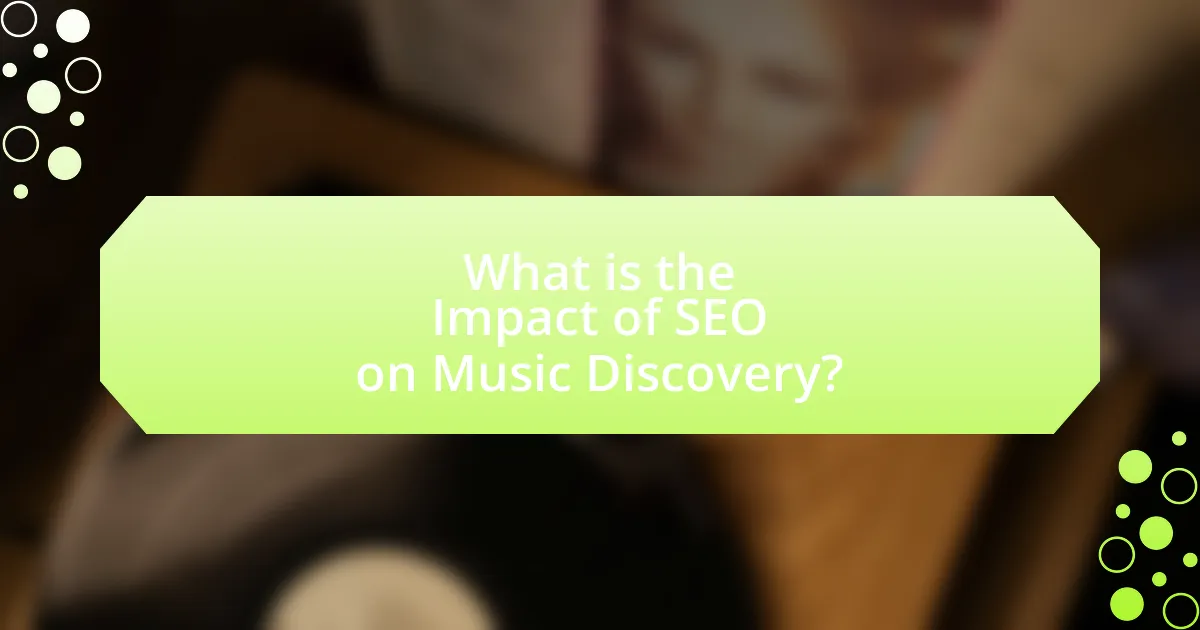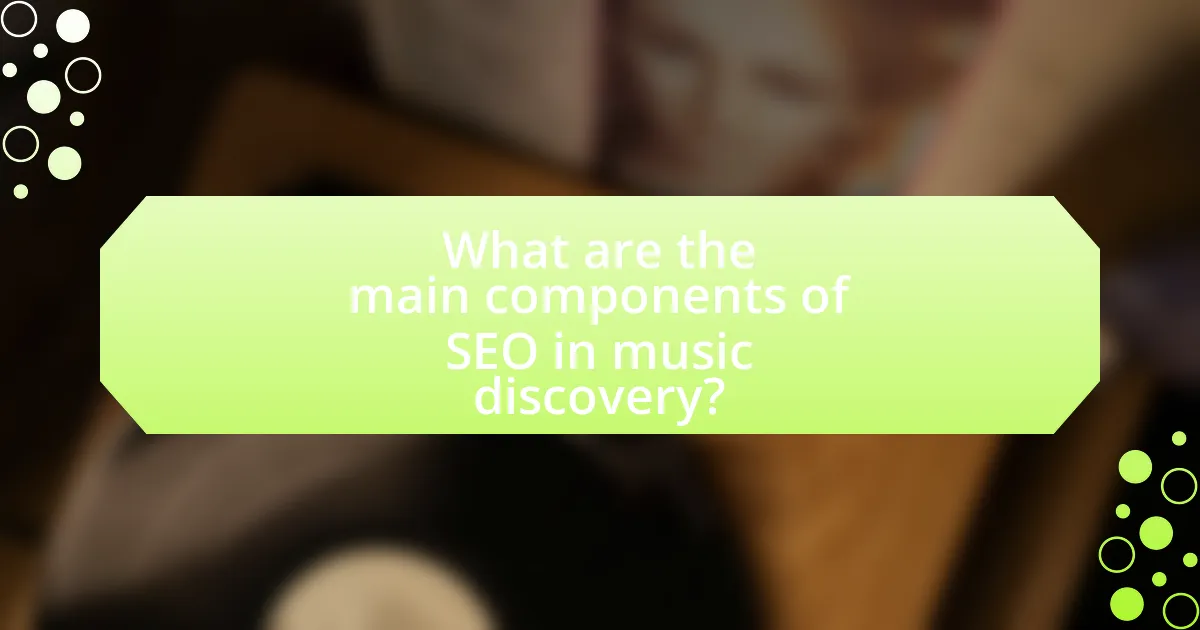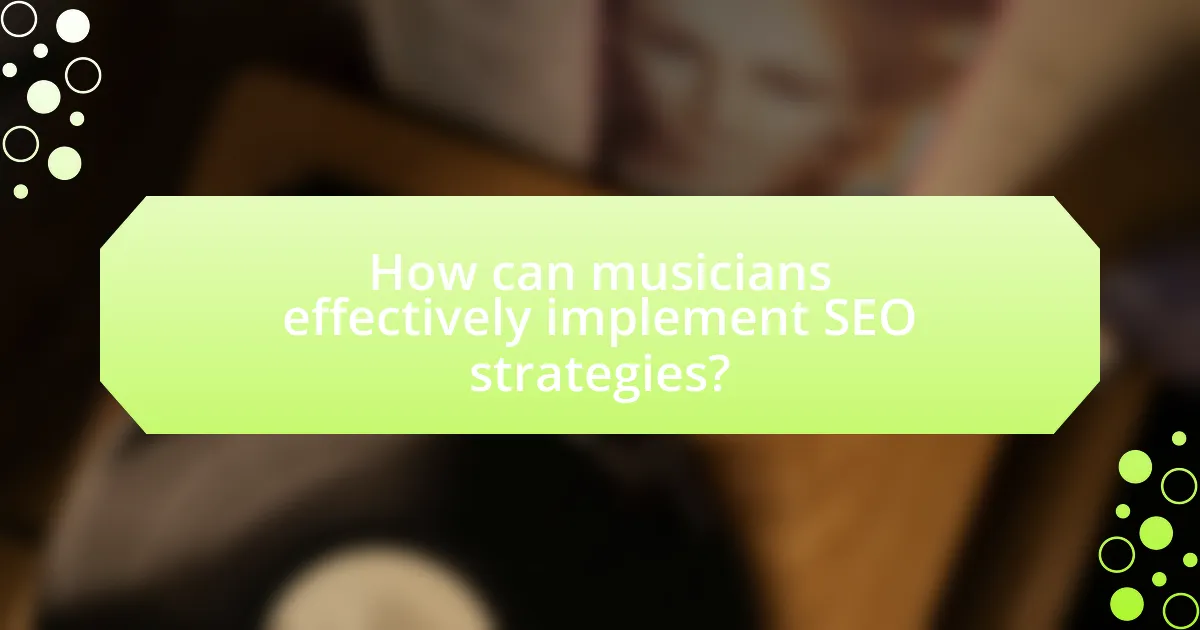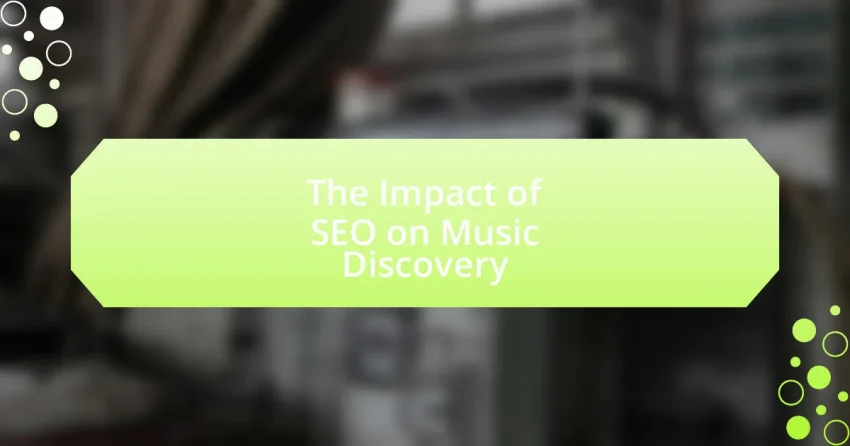The article examines the significant impact of SEO on music discovery, highlighting how effective optimization strategies enhance the visibility of artists and their work on search engines and streaming platforms. It discusses key SEO components such as keyword optimization, metadata management, and backlink building, which collectively improve music discoverability. The article also emphasizes the importance of audience engagement and consistent content creation in driving traffic and increasing listener interaction, ultimately contributing to an artist’s success in the competitive music industry. Additionally, it outlines common mistakes musicians should avoid and practical tips for implementing effective SEO strategies.

What is the Impact of SEO on Music Discovery?
SEO significantly enhances music discovery by improving the visibility of artists and their work on search engines and streaming platforms. When musicians optimize their content with relevant keywords, metadata, and engaging descriptions, they increase the likelihood of appearing in search results, which leads to higher traffic and potential listeners. For instance, a study by the Digital Music Association found that 70% of music listeners discover new artists through online searches. This demonstrates that effective SEO strategies can directly influence the reach and popularity of music, making it easier for audiences to find and engage with new sounds.
How does SEO influence the way music is discovered online?
SEO significantly influences the way music is discovered online by optimizing content for search engines, which increases visibility and accessibility. When artists and labels implement effective SEO strategies, such as using relevant keywords, optimizing metadata, and creating engaging content, their music becomes more likely to appear in search results. For instance, a study by Moz indicates that 70% of search engine users click on organic results, highlighting the importance of SEO in driving traffic to music platforms. Additionally, platforms like Spotify and YouTube utilize algorithms that favor content with strong SEO practices, further enhancing discoverability.
What are the key SEO strategies that affect music visibility?
Key SEO strategies that affect music visibility include optimizing metadata, utilizing keywords effectively, and building backlinks. Optimizing metadata, such as titles, descriptions, and tags, ensures that music content is easily discoverable by search engines. Effective keyword usage involves researching and incorporating relevant terms that potential listeners are searching for, which can significantly improve search rankings. Building backlinks from reputable sites enhances credibility and authority, further boosting visibility. According to a study by Moz, websites with higher domain authority, often achieved through quality backlinks, rank better in search results, leading to increased music discovery.
How do search engine algorithms prioritize music content?
Search engine algorithms prioritize music content based on relevance, user engagement, and metadata optimization. Relevance is determined by how well the content matches user queries, often assessed through keyword usage in titles, descriptions, and lyrics. User engagement metrics, such as click-through rates and time spent on pages, signal to algorithms that the content is valuable. Additionally, well-structured metadata, including genre tags and artist information, enhances discoverability. For instance, Google’s algorithm considers these factors to rank music content higher in search results, as evidenced by studies showing that optimized metadata can significantly improve visibility in search engine results pages.
Why is SEO important for musicians and music platforms?
SEO is important for musicians and music platforms because it enhances visibility and discoverability in a highly competitive digital landscape. By optimizing content for search engines, musicians can increase their chances of being found by potential listeners, which is crucial given that 70% of online experiences begin with a search engine. Effective SEO strategies, such as keyword optimization and quality backlinks, can lead to higher rankings on search engine results pages, driving more traffic to music platforms. This increased traffic can translate into more streams, downloads, and overall engagement, ultimately contributing to an artist’s success and growth in the music industry.
What benefits does effective SEO bring to independent artists?
Effective SEO provides independent artists with increased visibility and discoverability online. By optimizing their websites and content for search engines, artists can rank higher in search results, making it easier for potential fans to find their music. According to a study by HubSpot, 75% of users never scroll past the first page of search results, highlighting the importance of SEO in reaching a wider audience. Additionally, effective SEO strategies can lead to higher website traffic, which can translate into more streams, downloads, and merchandise sales, ultimately contributing to an artist’s growth and success in the competitive music industry.
How does SEO help music platforms attract more listeners?
SEO helps music platforms attract more listeners by improving their visibility in search engine results. When music platforms optimize their content with relevant keywords, metadata, and quality backlinks, they increase the likelihood of appearing at the top of search results, making it easier for potential listeners to discover their music. For instance, a study by Moz indicates that the first page of Google captures 71% of search traffic clicks, highlighting the importance of ranking high in search results. Additionally, effective SEO strategies can enhance user experience through faster loading times and mobile optimization, further encouraging listener engagement and retention.

What are the main components of SEO in music discovery?
The main components of SEO in music discovery include keyword optimization, metadata management, content creation, and link building. Keyword optimization involves researching and using relevant terms that potential listeners search for, ensuring that music is easily discoverable. Metadata management focuses on accurately tagging music files with essential information such as artist name, album title, and genre, which helps search engines categorize and display music effectively. Content creation encompasses producing engaging and shareable material, such as blog posts, videos, and social media updates, that can attract and retain listeners. Link building refers to acquiring backlinks from reputable sites, which enhances the authority and visibility of music-related content in search engine results. These components collectively improve the chances of music being discovered by a wider audience.
How do keywords play a role in music SEO?
Keywords are essential in music SEO as they help optimize content for search engines, making it easier for listeners to discover music. By strategically incorporating relevant keywords related to the music genre, artist name, song titles, and themes into metadata, descriptions, and promotional materials, musicians can improve their visibility in search results. Research indicates that 70% of music discovery occurs through search engines, highlighting the importance of effective keyword usage in driving traffic to music platforms.
What types of keywords are most effective for music-related searches?
Effective keywords for music-related searches include genre-specific terms, artist names, song titles, and phrases related to music events or trends. Genre-specific keywords, such as “indie rock” or “hip hop,” help target audiences looking for particular styles. Including artist names and song titles enhances search relevance, as users often search for specific tracks or musicians. Additionally, incorporating trending phrases like “new music releases” or “upcoming concerts” captures current interests, aligning with user search behavior. Research indicates that using a mix of these keyword types can significantly improve visibility and engagement in music-related searches.
How can musicians optimize their content with relevant keywords?
Musicians can optimize their content with relevant keywords by conducting thorough keyword research to identify terms that potential listeners are searching for. This involves using tools like Google Keyword Planner or SEMrush to find high-volume, low-competition keywords related to their genre, song themes, or specific lyrics. By strategically incorporating these keywords into titles, descriptions, and tags of their music on platforms like Spotify, YouTube, and social media, musicians can enhance their visibility in search results. Studies show that content optimized with relevant keywords can increase organic traffic by up to 50%, demonstrating the effectiveness of this approach in reaching a broader audience.
What is the significance of backlinks in music SEO?
Backlinks are crucial in music SEO as they enhance a website’s authority and visibility in search engine results. When reputable sites link to a music artist’s page, it signals to search engines that the content is valuable and trustworthy, which can lead to higher rankings. According to a study by Moz, backlinks are one of the top three ranking factors for Google, indicating their significant role in improving organic search traffic. Additionally, a strong backlink profile can drive referral traffic from other music-related sites, further increasing exposure and potential fan engagement.
How can artists build quality backlinks to enhance their music’s reach?
Artists can build quality backlinks to enhance their music’s reach by collaborating with music blogs, engaging in guest posting, and leveraging social media platforms. Collaborating with music blogs allows artists to have their music featured, which often includes backlinks to their official sites. Guest posting on relevant websites enables artists to share insights or experiences while embedding links to their music. Additionally, sharing content on social media platforms can lead to organic backlinks as followers share and promote the artist’s work, increasing visibility. According to a study by Moz, backlinks from authoritative sites significantly improve search engine rankings, which directly correlates to increased music discovery.
What role do social media and collaborations play in backlink strategies?
Social media and collaborations significantly enhance backlink strategies by increasing visibility and engagement, which leads to more inbound links. When artists or brands collaborate, they tap into each other’s audiences, creating opportunities for content sharing across platforms. For instance, a study by Moz indicates that social signals, such as shares and likes, can correlate with higher search rankings, as they drive traffic and encourage backlinks from other websites. Additionally, social media platforms serve as channels for promoting content that can attract backlinks from bloggers and influencers who discover and share the content, further amplifying its reach.

How can musicians effectively implement SEO strategies?
Musicians can effectively implement SEO strategies by optimizing their online presence through targeted keywords, engaging content, and strategic use of metadata. By researching and incorporating relevant keywords related to their music genre, lyrics, and themes into their website and social media profiles, musicians can enhance their visibility in search engine results. Additionally, creating high-quality content such as blog posts, videos, and social media updates that resonate with their audience can drive traffic and improve engagement. Utilizing metadata, including alt tags for images and proper tagging for audio files, further aids search engines in indexing their content accurately. According to a study by HubSpot, 75% of users never scroll past the first page of search results, highlighting the importance of effective SEO in reaching potential listeners.
What are the best practices for optimizing music content for search engines?
The best practices for optimizing music content for search engines include using relevant keywords, creating high-quality metadata, and ensuring mobile-friendliness. Relevant keywords should be incorporated into titles, descriptions, and tags to improve visibility; for example, using terms like “indie rock” or “pop music” can attract targeted audiences. High-quality metadata, including artist names, album titles, and genre classifications, helps search engines understand the content better, enhancing indexing. Additionally, ensuring that music content is mobile-friendly is crucial, as over 50% of music searches occur on mobile devices, according to a report by Google. These practices collectively improve search rankings and increase discoverability of music content online.
How can metadata improve the discoverability of music tracks?
Metadata improves the discoverability of music tracks by providing essential information that search engines and music platforms use to categorize and index content. This information includes details such as the track title, artist name, genre, release date, and keywords, which enhance search relevance. For instance, a study by the International Federation of the Phonographic Industry (IFPI) indicates that properly tagged metadata can increase a track’s visibility by up to 50% on streaming platforms. Accurate metadata allows algorithms to match user queries with relevant music, thereby facilitating easier access for listeners and increasing the likelihood of plays and shares.
What tools can musicians use to analyze their SEO performance?
Musicians can use tools like Google Analytics, SEMrush, and Ahrefs to analyze their SEO performance. Google Analytics provides insights into website traffic, user behavior, and conversion rates, allowing musicians to understand how visitors interact with their content. SEMrush offers keyword tracking, site audits, and competitor analysis, helping musicians optimize their online presence. Ahrefs specializes in backlink analysis and keyword research, enabling musicians to identify opportunities for improving their search rankings. These tools collectively empower musicians to enhance their visibility and reach in the digital landscape.
What common mistakes should musicians avoid in music SEO?
Musicians should avoid keyword stuffing in music SEO, as it can lead to penalties from search engines and diminish user experience. Instead, they should focus on using relevant keywords naturally within their content, including titles, descriptions, and tags. Additionally, neglecting metadata optimization is a common mistake; musicians must ensure that their audio files and web pages have properly filled metadata to improve search visibility. Failing to create quality backlinks can also hinder SEO efforts; musicians should engage with other artists and platforms to build a network that enhances their online presence. Lastly, ignoring mobile optimization is detrimental, as a significant portion of music discovery occurs on mobile devices; ensuring that websites are mobile-friendly can improve user engagement and search rankings.
How can poor SEO practices negatively impact music discovery?
Poor SEO practices can significantly hinder music discovery by reducing the visibility of artists and their work in search engine results. When music content is not optimized with relevant keywords, metadata, and proper tagging, it becomes less likely to appear in search queries, leading to decreased traffic and engagement. For instance, a study by Moz indicates that over 70% of users never scroll past the first page of search results, meaning that if music is not ranked highly, it risks being overlooked by potential listeners. Additionally, poor SEO can result in a lack of backlinks and social shares, further diminishing an artist’s online presence and reach.
What are the signs of ineffective SEO strategies in the music industry?
Signs of ineffective SEO strategies in the music industry include low organic search rankings, minimal website traffic, and poor engagement metrics. When a music artist or label consistently appears on the second or third page of search results for relevant keywords, it indicates that their SEO efforts are not effectively optimizing their online presence. Additionally, if the website analytics show a high bounce rate and low average session duration, it suggests that visitors are not finding the content engaging or relevant, further highlighting ineffective SEO practices. Furthermore, a lack of backlinks from reputable music blogs or industry websites can signify that the content is not being recognized or valued, which is crucial for improving search visibility.
What practical tips can musicians follow to enhance their SEO efforts?
Musicians can enhance their SEO efforts by optimizing their website with relevant keywords, creating high-quality content, and utilizing social media effectively. By incorporating keywords related to their music genre, location, and specific songs into website content, musicians can improve their visibility in search engine results. High-quality content, such as blog posts about their music journey or behind-the-scenes videos, can engage audiences and encourage sharing, which boosts SEO rankings. Additionally, active social media presence helps drive traffic to their website, as platforms like Instagram and Facebook can increase visibility and engagement, leading to higher search engine rankings. According to a study by Moz, websites with strong social signals tend to rank higher in search results, demonstrating the importance of social media in SEO strategies for musicians.
How can consistent content creation improve SEO for musicians?
Consistent content creation improves SEO for musicians by increasing their online visibility and engagement. Regularly publishing new music, videos, blogs, or social media posts signals to search engines that the artist is active, which can lead to higher rankings in search results. Additionally, fresh content provides more opportunities for keyword optimization, allowing musicians to target specific phrases that potential listeners might search for. According to a study by HubSpot, companies that blog consistently receive 97% more links to their websites, enhancing their authority and relevance in search engine algorithms. This increased authority can lead to more organic traffic, ultimately helping musicians reach a broader audience and grow their fan base.
What role does audience engagement play in successful music SEO?
Audience engagement is crucial for successful music SEO as it directly influences search rankings and visibility. Engaged audiences generate more interactions, such as likes, shares, and comments, which signal to search engines that the content is valuable. For instance, platforms like Spotify and YouTube prioritize content with higher engagement metrics, leading to better placement in search results. Additionally, according to a study by the Digital Marketing Institute, content that receives significant audience interaction can see up to a 50% increase in organic reach, further enhancing discoverability. Thus, fostering audience engagement not only boosts SEO performance but also amplifies music discovery across digital platforms.
